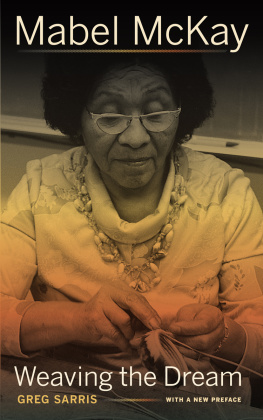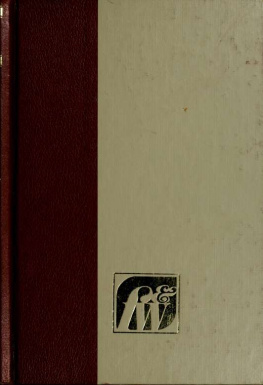LETTERS TO LITHOPOLIS
From O. Henry to Mabel Wagnalls
O. HENRY

This 2011 edition published by Barnes & Noble, Inc.
All rights reserved. No part of this publication may be reproduced, stored in a retrieval system, or transmitted, in any form or by any means, electronic, mechanical, photocopying, recording, or otherwise, without prior written permission from the publisher.
Barnes & Noble, Inc.
122 Fifth Avenue
New York, NY 10011
ISBN: 978-1-4114-5417-0
PREFACE
"The human Will, that force unseen,
The offspring of a deathless Soul,
Can hew a way to any goal,
Though walls of granite intervene."
IT is always a privilege to meet a great man. The revelation of him when off-guard and not busied with fashioning either forms or fancies for the public eye is sure to radiate some flash of personality that is inspiring. There are just two methods of encountering genius away from the limelightby a handshake or a letter. The handshake and exchange of words may be eternally impressiveto one person; but to meet, in the pages of a letter, with one of these soaring spiritsone whose altitude is measured by the depth of his insightthis is an exhilaration that may be shared with others. My first meeting with O. Henry was of this sort, and the thrill of astonishment I received I am enabled to pass on to every reader of this little book. The experience, surprising as it was delightful, had a prelude I must explain.
Some months before, I had read a story that greatly impressed me; it was "Roads of Destiny." Not only was I impressed by the originality of the idea and style, but also by the originality of the author's name. Just "Henry" with an exclamation before it. I wondered how a writer could hope to be remembered with such a casual tag-mark. What superb indifference to fame! Then, on second thought, I considered it a clever bid for famea name so coy as to be conspicuous. Then, on third thought, that Henry name began to stir up activities in other crevices of my brain. I had a great grandmother named Henry. Our family tree I had long since discovered to be sadly lacking in decorations. No stars or coronets hung on its boughs, nor even a horse-thief to vary the respectable monotony. Perhaps here was an offshoot I had misseda Henry branch that might prove illustrious. I searched in "Who's Who" and asked literary friends, but "O. Henry" was on no list of celebrities I could find. So I scribbled a few lines to his publisher, told who I wasor rather who my father wasand, as one publisher to another, so to speak, I begged to know whether O. Henry was man, woman, or wraith.
I mailed the missiveand forgot it.
Timebut why be prosaic? "The days," to quote from my favourite author, "with Sundays at their head, formed into hebdomadal squads, and the weeks, captained by the full moon, closed ranks into menstrual companies carrying Tempus Fugit on their banners."
By the time Thirty-fourth Street was displaying sport suits and parasols and the trunk stores were announcing instant removals, my mother and I made our annual visit to my grandmother's home in Lithopolis. You have possibly never heard of this town. Don't look for it on the map: it isn't there. And don't look for it from any railroad train window: it isn't there, either. Lithopolis stands alonefaithfully guarding an ancient stone quarry so long disused that no one knows when it last was drilled or blasted. Again let me say that Lithopolis stands alone, maintaining an aloofness, an exclusiveness, that is unmatched, I believe, by any other cluster of frame houses radiating around a one-block trading area of single-story shops. Not even the famous walled-in town of Rothenburg is so difficult to enter and so difficult to get out of after you're in. The daily mail-wagon was, at the time of our visits there, the sole public means of transit thither and thence; and likewise the one excitement of the day.
There are three hundred and fifty inhabitants in Lithopolisnever more, never less. The two hundred and eight houses it contains are kept in repair, and even rebuilt, but a new house is never added. Rather than do this people leave the townor die. It is cheaper. People never move to Lithopolis, but they can't help being born there. This is what happened to both my father and mother. Lithopolis is lite as the St. Nicholas Club of Manhattan: to belong to it you must be born to it. And, by way of further resemblance, its people are eternally clannish; they have a way of clinging to the home-town with a fondness that is irrefutable. Though the place is small and primitive, the surrounding hills are delightful, and the near-by ravine, with its winding stream, would thrill the heart of a Corot. The inhabitants are neighbourly and on good terms with one another in spite of the paling fences that divide off their front yards. Flowers grow near every doorway, and at the end of Main Street, up on the hill, is a picturesque graveyard shaded by stately elms and spruce that give it an impressive dignity.
There is a tinge of old-world aristocracy in the town's disdain for all phases of modern industry. Reposeful as a medieval princess in a rockbound castle, Lithopolis takes no heed of the whirring wheels and high-pressure mechanism of the outer world. The little community is almost self-sustaining. In its straggling business block you will find, besides the general store, a drug storethat indulges in literature on the side, a barber's shopvery active on Saturday evenings, and a butcher's shop that never saw a filet or a tenderloin. There is a millinery shop that cuddles close to the post office, and just beyond the second lane sounds a blacksmith's shop. The hardware store plies a good trade in plowsand also deals in coffins. There are four churches to say prayers over the coffins when they are filled, and on the other street (there are only two) is the shop of a tombstone-maker (her name is Alta Jungkurthmore of her later). And opposite to this shop stands the house and surrounding trees, the little garden and chicken corral of my eighty-year-old grandmother whose mother had been born a Henry.
Though the outlook from my grandmother's window was a bit doleful, the Lutheran church right adjoining imparted an atmosphere of peace and strength that enabled us to contemplate the tombstones across the way with equanimity. One grew quite accustomed to them, in fact. As new monuments were frequently erected in the graveyard to replace less pretentious ones, the discarded old stones became an accumulation. Whenever a good flat-surfaced slab was needed for any sort of purpose the neighbours knew where to ask for it. Mrs. Needles decapitated her chickens on a stout piece of slate that bore a worn inscription to Ezekiel Smith, born 1803died 1810. Another neighbour's front doorstep, had you peered underneath, told of one Hermann Baumgarten, who left this world in 1842.
All things were conducive to making my grandmother's home a peaceful place in which to dream dreams and put them into words. For this purpose I used to resort to the attica huge space with slanting roof, and to my mind the best furnished region in the house. There was a spinning wheel, and several old chests (one had a secret drawer), and, most eerie of all, was a huge-faced, highly decorated clock, decrepit and out of use, that stood on the floor. This clock had an uncanny way of striking One at rare intervals, apparently for no reason at all, though we finally concluded that some unnoticed jarring of the floor must have occasioned it. An apple tree bough, close to the house, swept across one of the attic windows. In the spring, when this bough was abloom and the window was openah!it was a place for any sort of wild fancy to unfold.















